Rekindling Literacy Instruction in Honduras

Strengthening teachers' skills is one way the De Lectores a Líderes project is working to improve literacy education in Honduras.
Every day, students in Honduras are confronted with significant barriers to getting a quality education. Few schools have computers, and many do not have enough books or teachers.
Students also face the pervasive threat of violence. Gang presence is particularly acute in Honduras’ large cities, and gang members often infiltrate schools, intimidating teachers and students. In some cases, gangs prevent students and teachers from attending classes, as the walk to school would require them to pass through rival territory.
But teaching young students how to read, says teacher Elena Morales,* gives them relief from daily stressors and opens their minds to new ideas and experiences—and at the same time provides them with the skills they need to take advantage of future educational, economic, and civic opportunities.
“The only thing that can give hope to children is reading,” says Morales. “[When they read], their mind flies to other places.”
Morales is one of more than 800 teacher facilitators with EDC’s USAID-funded De Lectores a Líderes project, which is working to improve literacy education for more than half a million students in Honduras. The project—also known as the Honduras Reading Activity—is an important part of an education-based effort to interrupt the cycle of poverty and violence that has existed in Honduras for decades.
De Lectores a Líderes is a national effort, and project staff are working closely with the Ministry of Education to strengthen the educational system in Honduras. In addition to teacher training, the project is also updating the national literacy standards, revising and developing teaching and learning materials, establishing public-private partnerships to support improved literacy outcomes, and creating school and community libraries.
But at the core of the project are dedicated teacher facilitators like Morales, who models effective teaching strategies, observes lessons, and helps teachers improve their literacy instruction at a school in a gang-controlled community in Tegucigalpa, the country’s capital.
Alba Espinoza* is another teacher facilitator. She journeys four hours—two by bus, two by foot—to do similar work in a remote community of about 300 people in the western part of the country. The rural village lacks electricity, cell phone service, and Internet access, and without Espinoza’s weekly trips to the community, it is unlikely that the teachers there would ever receive any support.
“Basic things, like making photocopies, is difficult here,” says Espinoza. “It's like being on an island.”
Both Morales and Espinoza face many challenges in the schools they support. But the work they are doing is critical to the long-term improvement of Honduras’ educational system, says EDC’s Vilma Valerio, who is the teacher training advisor for De Lectores a Líderes.
“The work of teacher facilitators is the backbone of the project,” says Valerio. “They are the ones who train and accompany the broad base of classroom teachers, and they represent the only real chance for sustainable activity due to their place in the educational system.”
Valerio adds that this peer-coaching approach is relatively new in Honduras, where teacher professional development has often been perceived as an administrative task rather than as a tool to drive systemic educational change. However, teacher facilitators such as Morales and Espinoza are inspiring educators to improve their practice.
“Through their effort, passion, and conviction, [the teacher facilitators] will radiate the energy needed to improve day-to-day teaching of reading and writing in Honduras,” says Valerio.
For evidence that this approach is working, one only has to talk to Morales, who remains dedicated despite the many challenges that she—and the teachers and students she supports—face every day.
“We do not give up,” she says. “Outside these walls, there are constant problems of violence and gangs, but we fight for children.”
*For safety reasons, some names have been changed.